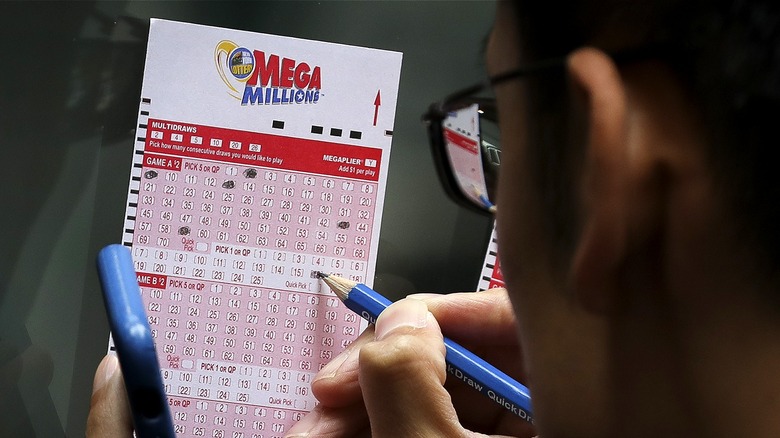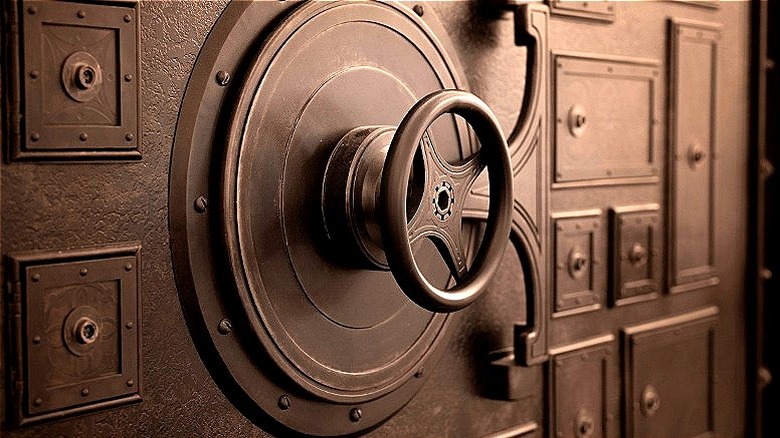Why Mega Millions Winners Don't Always Claim Their Prize Money Immediately
A Mega Millions lottery ticket was sold in New Jersey in March 2024. It's not an ordinary lottery ticket, however; after the draw, its owner became entitled to the winnings of a jackpot worth $1.128 billion, estimated at almost $537 million after taxes (winning the lottery isn't among the little-known ways to get a bigger refund, by the way). Six months later, the Mega Millions ticket still had not been claimed and the winnings sat idly waiting for their owner. It wasn't until December 2024 that the winner stepped forward to start the claiming process. Winners in New Jersey can wait for up to a year before making their claim, but with a haul of this magnitude, why would anyone want to?
The truth is there are a variety of reasons for seemingly odd behavior surrounding a major windfall like winning a Mega Millions jackpot. It might be tempting to raise your hand straight away and sail off into the distance with a horde of cash, but there's more to winning a huge jackpot than just collecting your check. Everyone who has purchased a lottery ticket before (something many frugal individuals actually avoid and refuse to buy) has dreamed of what they'd do with the money. Savvy Mega Millions players have a strategy for what they'd do if they managed to be struck with enough luck to win. The difference might seem insignificant, but it can be a game changer. After all, plenty of lottery winners have taken home huge pots of cash only to end up broke.
They need time to decide on a lump sum or an annuity
Lottery winnings aren't as straightforward as the number on the sign. In most cases, a winner can decide between a cash payout figure and the entirety of the winnings paid out in installments over 20 years. This is the first big decision a winner must make, and it's not exactly an easy one: If you win the lottery, is it better to take the lump sum or an annuity? The lump-sum figure might be half the jackpot amount, leading many to question the wisdom in selecting this option. Although you will receive a figure that's still sizable as a jackpot winner, it's nowhere near as large as the whole pot, right?
The reality is that either decision might be the right one for an individual winner; it all depends on the plan. Those who will utilize their lottery winnings as an income replacement and spend most of it, might be better off taking the long-term distribution option. On the other hand, savers shouldn't go near this choice. Taking the lump-sum payout could generate far more earnings than the face-value figure. Invested capital generally doubles every seven years, meaning a winner will have almost three whole doubling events between the time they claim their winnings and the 20-year mark when the payout schedule expires.
Take a $1 million investment. After 20 years, this could turn into $8 million if compound-interest principles are left to work their magic on a sound investment strategy. Now, obviously, winners won't invest their entire jackpot, but in the case of a $1.128 billion Mega Millions win with a take-home value at about half a billion dollars, the winner isn't going to notice if even 99% of that money is locked up in investments (leaving over $5 million still in liquid cash).
They're working with a financial adviser on a careful plan
Anyone who wakes up one morning to find they've come into a huge sum of money should run to a financial adviser they trust. Financial advisers aren't all created equal, however; you should always try to prioritize using an adviser that's sworn to a fiduciary duty, not just any run-of-the-mill adviser you come across. Fiduciaries are bound by law to uphold the best interests of their clients, even if it contradicts their own personal interests.
Not only can a financial adviser help you understand whether a lump sum or stream of payouts is better for your situation, but advisers can also point lottery winners in the right direction when it comes to protecting their winnings. Investing at least a portion of the money will help secure it for the future. With such a massive influx of cash coming from a Mega Millions win, it doesn't actually take much of the proceeds to create a lasting estate that'll cater to you and your family for multiple generations.
Case in point, a $10 million investment that utilizes the 4% rule (a retirement savings strategy) would yield a payout of $400,000 in the first year, far surpassing the real financial demands of just about any family in America. A financial adviser is a must-have resource for anyone experiencing the bliss of a lottery win like this. The decision to talk to a professional can transform a financial future suddenly gifted with immense wealth and protect it for many years to come.
They have safety concerns after winning their big prize
Winners in New Jersey, where the March 2024 Mega Millions winning ticket was sold, can choose to claim their prize anonymously. Laws in 18 U.S. states allow for anonymity for lottery winners, although some feature clarifying rules like in Virginia where anonymity isn't possible unless the prize is greater than $10 million.
Winners of massive prizes, like statewide or multistate lotteries, are often the target of seemingly simple requests from friends and family. While a winner might want to help provide for their loved ones as part of their winnings, with a huge windfall, every distant cousin you never knew you had might ultimately show up on your doorstep. Lottery winners will want to be sparing with their gifts to friends and family, and some might even seek to remain entirely quiet about this change in their financial fortunes. This can be a good strategy to help mitigate awkward requests, but it may also feel like a necessity for some.
Winners of tremendous prizes can occasionally become targets of criminal attention. In 2005, for example, an Irish woman won 115 million euros (~$140.5 million) in a EuroMillions draw, only to see her son become the target of an attempted kidnapping by criminals seeking to extort some of her winnings when they discovered her good fortune, as reported by the Irish Independent at the time.



